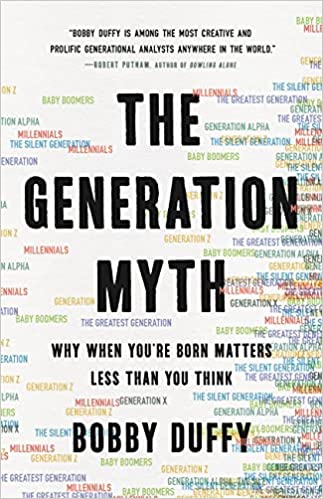You have /5 articles left.
Sign up for a free account or log in.
 The Generation Myth: Why When You’re Born Matters Less Than You Think by Bobby Duffy
The Generation Myth: Why When You’re Born Matters Less Than You Think by Bobby Duffy
Published in November 2021
How frequently do generational stereotypes get casually tossed around within higher education?
It is still not uncommon to hear talk about “digital natives” in conversations about comfort levels with learning technologies.
While perhaps less public, there remains an undercurrent of belief among some technologists that older faculty are less facile with software and hardware than their younger colleagues.
Nor are worries about younger generations absent from discussions related to higher education. Today’s students are often painted with the generational brush of being grade-grubbing snowflakes, a prejudice accelerated by the 2014 publication of William Deresiewicz’s Excellent Sheep.
The lazy generational thinking that pervades much of the discourse on social trends, and to which higher education is not immune, motivates Bobby Duffy’s excellent new book, The Generation Myth: Why When You’re Born Matters Less Than You Think.
Duffy, a professor of public policy and director of the Policy Institute at King’s College in London, has written a carefully reasoned and highly persuasive book-length argument against an overreliance on generational explanations.
This is not to say that Duffy is against all generation-based arguments. Instead, he reminds us that we need to consider three factors when thinking about the causes and consequences of group attitudes and behaviors. These factors are:
- Period effects: Events and trends that all ages experience within a specific time frame.
- Life-cycle effects: Events that people experience as they age.
- Cohort effects: Ideas, norms, beliefs and behaviors common to people within a generation.
Applying the frameworks of period, life cycle and cohort are particularly effective when thinking about the impact of COVID-19 on higher education. The pandemic has undoubtedly affected all of us—and every age group—within and across the postsecondary ecosystem. That period effect of COVID is also paired with a potentially significant cohort effect, as time will tell what long-term consequences the pandemic will have for people who were college students during the emergency shift from residential to remote learning.
In reading The Generation Myth, I realized that I did not have a firm grasp on the definition of each generation. While Duffy is skeptical of broad generational explanations, he does allow that cohort effects can be significant in understanding the challenges faced by specific generations.
It turns out that there is some disagreement on how generations should be defined. For my definitional thinking, I'm persuaded by my dad’s (a now-retired housing demographer from Harvard) arguments for defining the generations in consistent 20-year time frames.
Keeping the length of each generation consistent at 20 years allows for direct comparisons across the generations.
A 20-year generational approach looks like this:
- Baby Boom: Born 1946 to 1964
- Generation X: Born 1965 to 1984
- Millennials: Born 1985 to 2004
- Generation Z: Born 2005 to 2024
If we follow the above generational definitions, we discover that higher education is at a transition point where the oldest Gen Zs (those born in 2005) will be starting to enter college.
Millennials, whom Duffy writes about as the most ridiculed of all generations (see snowflakes), can add navigating COVID as college students to their list of generational challenges. (Such as hugely expensive starter housing prices and high average student debt levels, to name two.)
What will be the cohort implications of our now-arriving Generation Z college students?
Will membership in Gen Z have any predictive or explanatory power for college student outcomes for this cohort?
And will period and life-cycle effects swamp cohort-based explanations for understanding the trends that will determine the future successes and challenges of the latest generation of students to come to our physical (and virtual) campuses?
As a member of a generation that nobody ever talks about (Gen X), I immensely enjoyed reading The Generation Myth. (Duffy is illuminating as to why my generation is largely ignored.)
Anyone thinking about the future of higher education would be wise to consider period, life-cycle and cohort effects in their mental models.
Reading The Generation Myth can help us all avoid our tendencies to think too simplistically about the relationship between generations and higher education.
What are you reading?




